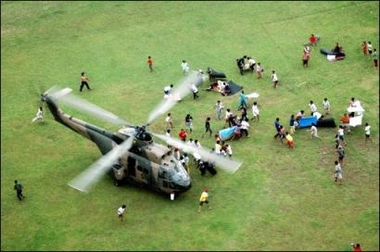Asia-Pacific
Prayers in Indonesia as looters hinder quake aid
(AFP)
Updated: 2006-06-02 14:47
 |
Large Medium Small |
Survivors of the Indonesian earthquake have held their first prayers since the disaster after looters raided aid convoys bringing food and medicines to stranded victims.
 Villagers rush for food and clothing supplies at Prambanan subdistrict. Survivors of the Indonesian earthquake have held their first prayers since the disaster after looters raided aid convoys bringing food and medicines to stranded victims. [AFP] |
As thousands flocked to mosques across Central Java, many survivors who had spent six nights in the open were still waiting for help as trucks loaded with badly-needed supplies were ambushed en route, a disaster relief official said.
The official from the government's National Coordinating Board for Disaster Management said increasingly impatient Indonesians were resorting to "stupid acts" in the wake of last Saturday's 6.3-magnitude quake.
"If there are trucks with only civilians guarding them, then they will stop and extort bags of rice and boxes of noodles," the official told AFP on condition of anonymity.
Most of the looting incidents have taken place in hard-hit Bantul district south of Yogyakarta, the main city in the quake zone, according to reports from convoy drivers and residents, the official said.
"People are not getting the goods because they never arrive," he said.
"Right now it's the people who are living near the roads who are getting all the goods. Once you go inside the villages, inside the small roads, there are places that have nothing," he said.
At least 6,234 people were killed, 46,000 injured and more than 139,000 homes destroyed in the temblor, which devastated large swathes of Central Java and Yogyakarta provinces.
The United Nations said aid was moving more freely, but that the threat of infection was growing because of overcrowding in hospitals.
"I believe the figures for the casualties are stabilizing at around 6,000 killed," Charlie Higgins, who is heading UN relief efforts on the ground, told a press briefing that was jolted by one of hundreds of aftershocks to strike the area since Saturday.
"It's particularly the injured and the homeless that we are concerned with."
Higgins said logistical problems with the distribution of aid supplies, such as traffic jams on narrow roads and logjams caused by the arrival of aid-laden planes at the Yogyakarta airport, should be overcome in the next few days.
Georg Petersen, the World Health Organization (WHO) country representative in Indonesia, warned that overcrowding in area hospitals and the threat of infection and disease remained serious concerns.
"The risk of infectious diseases has increased and there needs to be a surveillance system in place and a reporting system," he said.
As hospital wards spilled over with patients, another 300 survivors in hard-hit Klaten district were admitted with food poisoning after eating rice meals donated by an unidentified man, the state Antara news agency reported.
Across the quake zone traumatised students trudged back to school in places where they were operating, but authorities said more than 1,200 schools had been too badly damaged to open.
"Whatever the disaster is like, education should never stop. So we're trying our best in this emergency situation to keep the schools running," said Sugito, who heads the education office for Yogyakarta province.
"The most urgent thing we have to do is deal with the trauma among teachers as well as students," he told AFP in an interview.
"We're all sad. We can't study any more," said 16-year-old Ari Katoni, one of an estimated 250,000 students without a school.
"We're scared we may not have our classes as usual," he said. "We were supposed to have started yesterday, but it was delayed."
Mount Merapi volcano, just north of the quake zone, spilled lava and heat clouds for a seventh consecutive day Friday, amid warnings that an eruption remained possible.